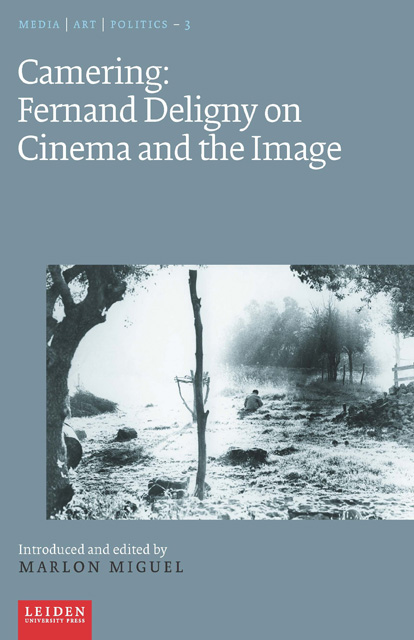Book contents
- Frontmatter
- Contents
- Epigraph [1996]
- Translator’s Note
- General Introduction
- Cinema. Cine-Club [1934]
- The Camera, a Pedagogical Tool [1955]
- He’s Still One of Us [1971]
- Camering [1977]
- Miscreating [1979]
- Camering [1982]
- The Alga and the Fungus [1982]
- Fossils Have a Hard Life: Apropos of the Image [1982]
- Camering [1978-1983]
- The Distinctiveness of the IMAGEs [1988]
- What Is Not Seen (by the Self ) [1990]
- Postface. Minor Gestures, Minor Media
- Frontmatter
- Contents
- Epigraph [1996]
- Translator’s Note
- General Introduction
- Cinema. Cine-Club [1934]
- The Camera, a Pedagogical Tool [1955]
- He’s Still One of Us [1971]
- Camering [1977]
- Miscreating [1979]
- Camering [1982]
- The Alga and the Fungus [1982]
- Fossils Have a Hard Life: Apropos of the Image [1982]
- Camering [1978-1983]
- The Distinctiveness of the IMAGEs [1988]
- What Is Not Seen (by the Self ) [1990]
- Postface. Minor Gestures, Minor Media
Summary
1.
I just learnt, on the radio, that when Arthur Rimbaud, the brilliant rascal from Charleville, wrote ‘le bateau ivre’ (‘The Drunken Boat’), he had never seen the sea.
What to make then of all he described in those verses that left their mark on the poetic art?
We need to tell ourselves that there is décrire, describing, and d’écrire, writing.
Is the latter writing from somewhere—from somewhere and about something?
I say this because the dictionary, which includes two written lines on the meaning of the word cinematography, cites, in italics, a bit of Jean Cocteau: cinematography is an art.
With Rimbaud, one sees what the art of writing can be.
There thus remains camering, and I have deliberately evaded filming, instead hanging ‘to camer’, the infinitive of a verb that—Still?—doesn't mean anything, as the banner over these pages.
I’m not a cameror.
I write; I live close to children said to be autistic. From where do I write? From there.
2.
From there, where I live, I see the world—like everyone else. It's not human.
From the sea, we have come. There was nothing, nothing but the sea, and then the bustle of it, and the algae and all the rest.
From the human, we have come. At first, there was nothing, nothing but a species that was completely unique, and now here we are, in both the here and now, certain of us equipped with a camera slung over our shoulders.
Chamberlains? The thing is that there would be a pope in the chamber.
Chambermaids? Then they would be waiting hand and foot on the princess.
Where Rimbaud had vocabulary, they have film. They have blank rolls and they have seen films; what they might connect is the earth to the moon.
3.
‘To camer’ is an infinitive, like ‘to see’. For seeing to take place, it remains necessary for someone to look, so to speak. To go about camering, one needs a cameror of sorts.
If, having taken up the habit of writing, I can call myself a writor, that other person is a cameror.
Thus begins a change in direction.
As a writor, my culture is much older than that of the cameror, which appeared after 1900. It hasn't even been a century? What can there be to an art that is barely fifty-odd years old?
- Type
- Chapter
- Information
- Camering Fernand Deligny on Cinema and the Image , pp. 103 - 112Publisher: Amsterdam University PressPrint publication year: 2022

